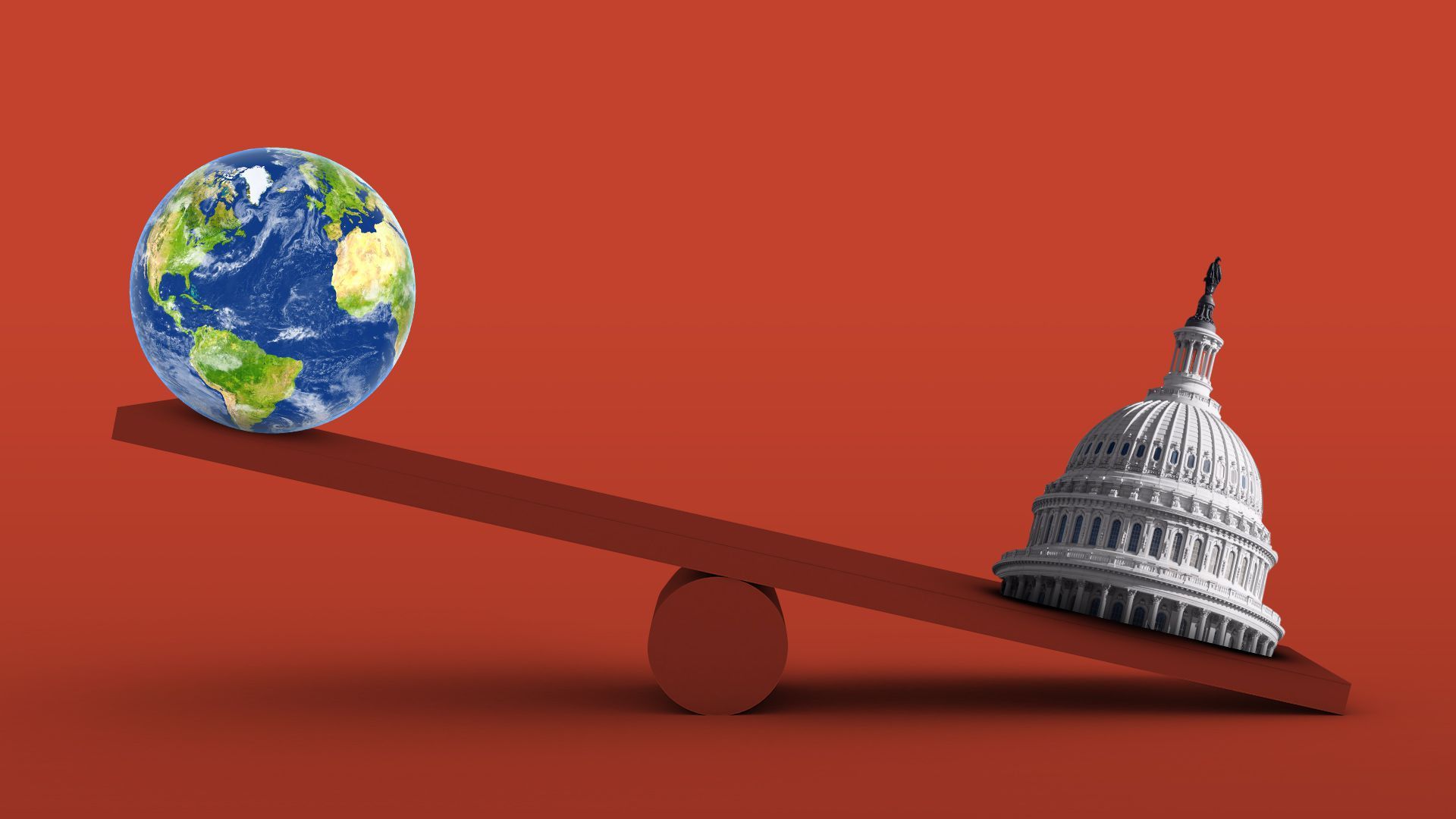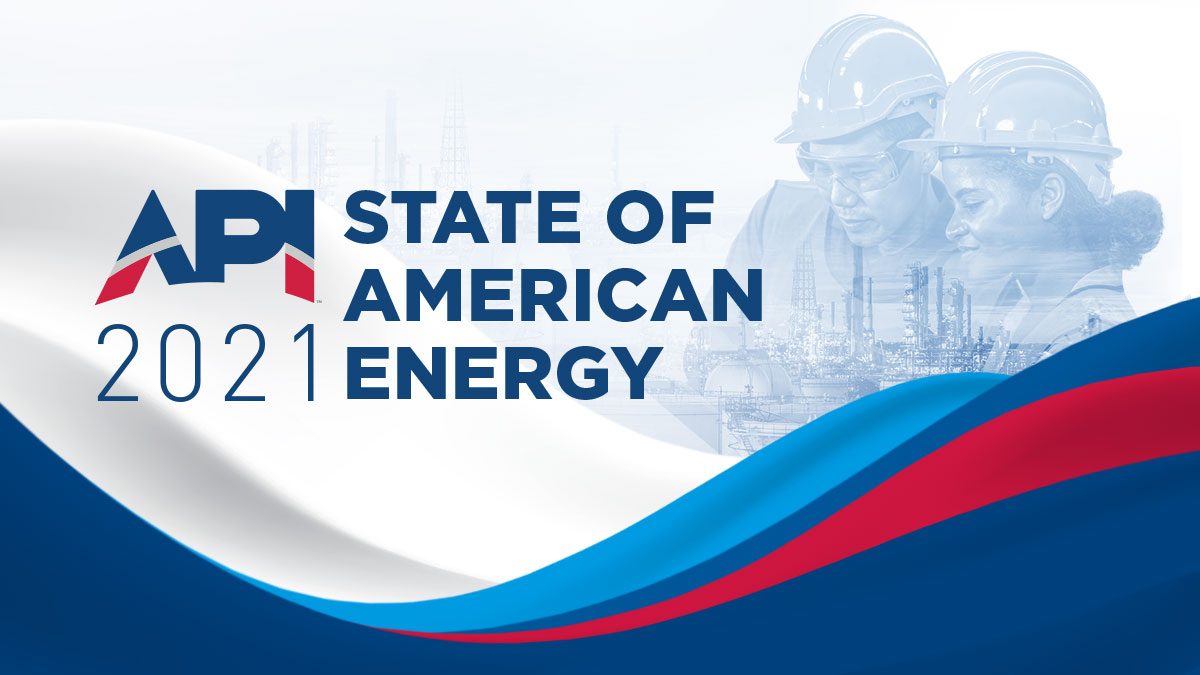| | | | | | | Presented By the American Petroleum Institute | | | | Generate | | By Ben Geman ·Jan 05, 2021 | | Good morning! Today's Smart Brevity count: 1,190 words, 4½ minutes. 🎸And today marks the 1973 release of Bruce Springsteen's debut album "Greetings from Asbury Park, N.J.," which provides a ragged, jagged melody that's today's intro tune... | | | | | | 1 big thing: The bear case for big energy and climate deals... |  | | | Illustration: Aïda Amer/Axios | | | | Anyone thinking that the immediate past is a prologue for Capitol Hill dealmaking could be in for rough years ahead. Catch up fast: In late December, Congress passed and President Trump signed legislation to cut a major greenhouse gas, extend clean energy tax incentives and bolster Energy Department tech deployment programs. Why it matters: That bill was a big deal. But, looking ahead, today brings the runoff elections in Georgia. - Unless Democrats beat the odds and win both contests, that means at least two years of a Democratic White House and GOP-led Senate — not the deal-friendly landscape seen in the Obama years.
- If Democrats do win, they'll govern with the thinnest possible margin.
- And parts of President-elect Biden's agenda need Congress — notably huge increases in clean energy infrastructure spending — even as he plans aggressive executive moves.
What we're watching: With the caveat that journalists have a not-awesome track record on gaming out the future, the bear case on more big deals looks something like this... 1. December's deal was its own animal. The year-end bill phases down hydrofluorocarbons, the powerful planet-warming gases used in air conditioning and refrigeration. - But that's far less politically volatile terrain than mandates to cut carbon emissions from fossil fuels, which face lots of GOP resistance, as the Washington Examiner points out.
- And the HFC phasedown was not even especially controversial, enjoying buy-in from powerful manufacturers.
2. Big spending plans could struggle for traction, even though the need for more COVID-19 relief could provide a vehicle. - Biden wants to spend $2 trillion over four years on climate-friendly initiatives.
- But as a number of analysts and reporters have pointed out, once Biden is in power, Republicans may revive their fallow deficit concerns.
3. The whole December thing was kind of weird. The deal hitched a ride on a COVID relief and government funding package during a lame-duck session, ahead of a change in White House control, and while party control of the Senate was unknown. 4. Trump will cast a shadow. Yes, he rejects climate science but wound up signing not one but two bills during his only term that bolstered CO2 capture and storage credits (the first was in 2018). - But that said, we're seeing right now that a number of Republicans don't want to run afoul of Trump's base, so if he snipes at a potential deal from the sidelines, well, that matters.
5. The left is feeling restive too. The year-end deal bolstered tech that Republicans and some Democrats like that nonetheless make progressives queasy, like CO2 capture and nuclear. - That could make dealmaking tougher in the thinly divided House.
- Related: the Congressional Progressive Caucus has reorganized itself as it looks to operate with more unity.
|     | | | | | | 2. ... plus the bull case, in brief | | Ok all that said, is there room for some things to move, maybe in a piecemeal fashion? Yeah, probably. The big picture: If Democrats somehow win both runoffs, they could pass some measures without needing a supermajority via the budget reconciliation process. - But even if control is divided, at some point (maybe?) the idea of an infrastructure package will stop being a running gag, which could provide an opening around areas like mass transit and EV charging.
What they're saying: Check out Josh Barro's latest Business Insider column. It argues GOP infighting over Trump's baseless election theft claims could bode well for Biden (though it doesn't address energy specifically). - "When your opposition is weak and divided is the best time to split them and make deals," he writes.
|     | | | | | | 3. The head start on "electrify everything" |  Data: Energy Institute at Haas; Map: Axios Visuals Good news if you're a fan of the "electrify everything" push as a way to rein in CO2 emissions: It's already happening! Driving the news: A new working paper from UC Berkeley business professor Lucas Davis charts the share of U.S. homes that use electricity as their main heating source. - It went from 1% in 1950 to almost 40% by 2018. The paper, using Census data, maps it through the decades (two snapshots are above).
- It has occurred "mostly without any policy intervention," notes Davis, who works with the school's Energy Institute at Haas.
Why it matters: Going electric for heating and other equipment that now use oil or gas, paired with an increasingly low-carbon power mix, is a tool against global warming. The intrigue: Davis looked at several forces that have driven the trend. - Changes in energy prices — notably a general decline in power prices and rise in gas and heating fuel — has been by far the most important.
- But there's lots of regional variation in energy costs, heating needs and how much electrification has occurred (as the maps show).
Yes, but: Policies to spur electrification would have differing regional costs and impacts on residents. One of them: "In general, much smaller subsidies would be necessary in warmer states." The bottom line: "One implication of the research is that, nationally, it may be a lot easier than is generally believed to encourage electrification," Davis writes. - There are "large numbers of additional households for whom adopting electric heating would impose relatively modest costs."
|     | | | | | | A message from the American Petroleum Institute | | COMING SOON: State of American Energy 2021 | | |  | | | | The American Petroleum Institute will release its annual State of American Energy report, "Building The Future," Jan. 13, outlining the consequential role natural gas and oil will play in America's future, for decades to come. Visit API.org for updates. | | | | | | 4. EPA completes controversial science rule | | The Washington Post reports: "The Environmental Protection Agency has finalized a rule to limit what research it can use to craft public health protections, a move opponents argue is aimed at crippling the agency's ability to more aggressively regulate the nation's air and water." How it works: Per their piece and others, EPA says it will give more weight to scientific studies that make their underlying data public. - "The agency concluded that the E.P.A. or anyone else should be able to independently validate research that impacts regulations," the New York Times notes.
What they're saying: EPA head Andrew Wheeler, in a Wall Street Journal op-ed last night, said the rule would "make the agency's scientific processes more transparent." - "Our rule will ... increase opportunities for the public to access the 'dose-response' data that underlie significant regulations and influential scientific information," he writes.
The other side: Chris Zarba, a former head of EPA's Science Advisory Board, tells the Post that while the premise "sounds good on the surface," the rule will in practice it will sideline science to benefit "special interests." - Overall, per their piece, researchers say it steers EPA away from important health studies that rely on confidential medical records and other proprietary data.
Between the lines: The Biden administration is expected to try and scuttle the regulation, but that's a lengthy bureaucratic process, multiple reports say. |     | | | | | | 5. Catch up fast on oil: markets, litigation, policy |  | | | Illustration: Rebecca Zisser/Axios | | | | OPEC: "Oil edged higher ahead of a resumption of OPEC+ talks that were unexpectedly suspended due to a disagreement over whether to raise output in February as the coronavirus continues to surge." (Bloomberg) Supreme Court: "Dozens of energy giants have petitioned the U.S. Supreme Court to review First Circuit and Ninth Circuit decisions that allowed climate change suits to play out in state court, just weeks before the justices are set to hear oral arguments in a related case from the Fourth Circuit." (Law360) Agencies: "[T]he Trump administration on Monday finalized a plan to dramatically increase the land available for oil and gas drilling in the National Petroleum Reserve-Alaska, an effort already facing legal challenges from groups concerned about threats to polar bears, caribou, migratory birds, climate change and subsistence resources." (Anchorage Daily News) |     | | | | | | 6. Quote of the day | | "The Visigoths are attacking." Who said it: Energy analyst Philip Verleger, speaking to Argus Media about the pressure on Exxon from groups of activist shareholders. Why it matters: Exxon is facing mounting calls to do more on climate and rein in spending — like this effort backed by California's huge teachers' pension fund. - "My expectation is that ExxonMobil will cut its capital expenditures and take other steps to appease the (activist) investors," Verleger said.
|     | | | | | | A message from the American Petroleum Institute | | COMING SOON: State of American Energy 2021 | | |  | | | | The American Petroleum Institute will release its annual State of American Energy report, "Building The Future," Jan. 13, outlining the consequential role natural gas and oil will play in America's future, for decades to come. Visit API.org for updates. | | | | | | Axios thanks our partners for supporting our newsletters.
Sponsorship has no influence on editorial content. Axios, 3100 Clarendon Blvd, Suite 1300, Arlington VA 22201 | | | You received this email because you signed up for newsletters from Axios.
Change your preferences or unsubscribe here. | | | Was this email forwarded to you?
Sign up now to get Axios in your inbox. | | | | Follow Axios on social media:    | | | | | |







No comments:
Post a Comment